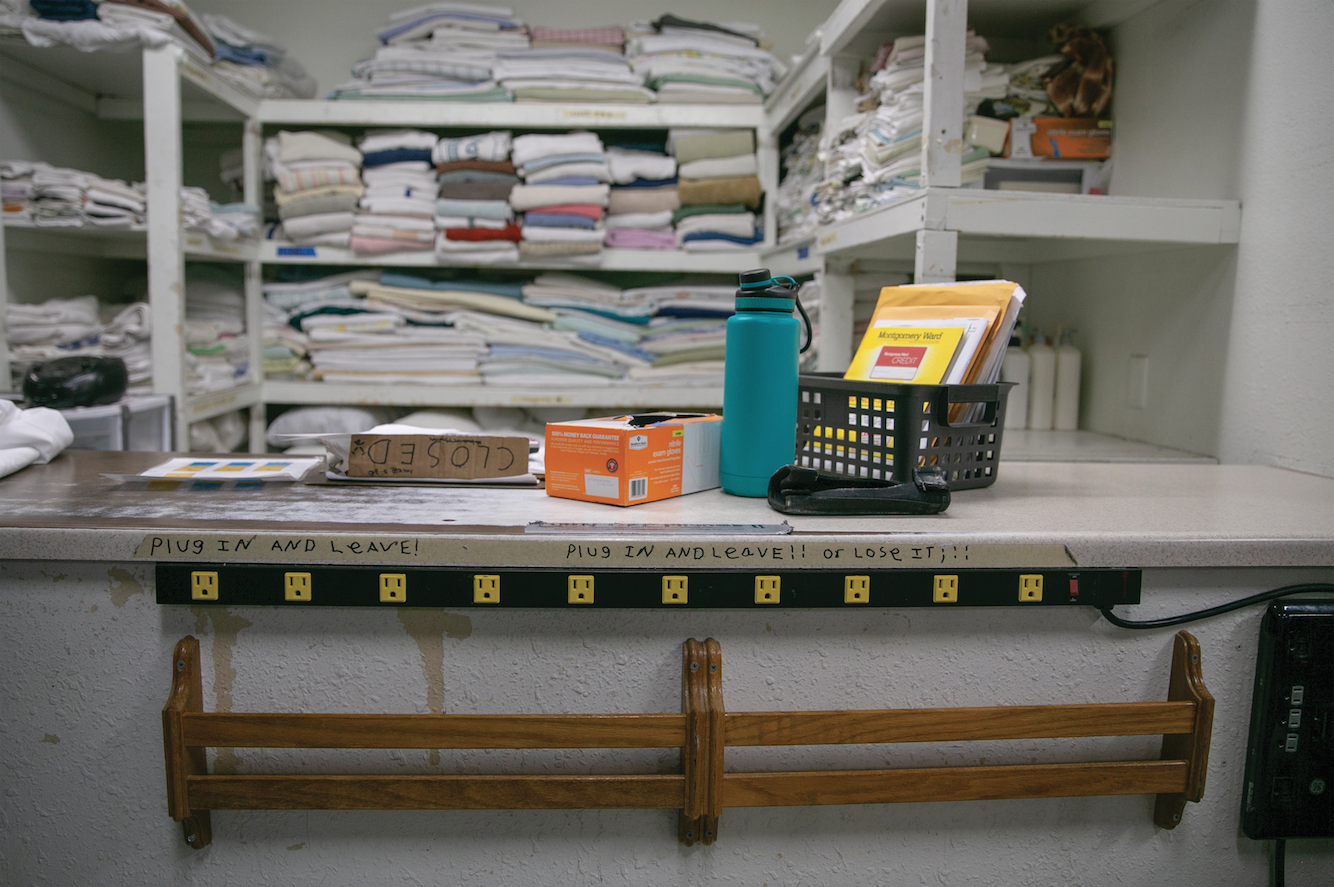Grand Junction’s Homeward Bound Program – Doing Better on the Western Slope
Every morning, staff and volunteers at Homeward Bound, which provides beds for 120 unhoused individuals, wash the sheets to ensure a fresh bed. Credit: Giles Clasen
By Giles Clasen
In 2019, voters in Denver overwhelmingly rejected a law that would have overturned the city’s eight-year camping ban. Those opposing the bill, including the Downtown Denver Partnership, proclaimed, “We can do better.”
While Denver area residents have yet to see what steps the city will undertake, Greg Moore, the executive director of Grand Junction-based shelter, Homeward Bound, believes his community already is “doing better.”
Homeward Bound is a nonprofit that offers temporary housing to men, women, and children experiencing homelessness in the Grand Junction area. In fact, they are the only temporary, year-round shelter currently available within 240 miles. Grand Junction has a camping ban as well, but the law prohibits police from giving tickets if shelters are full.
Moore said Grand Junction is doing better because there is cooperation between the public, private, and nonprofit organizations in Grand Junction.
“There is a very effective interagency cooperation that exists here that I haven’t seen in other areas,” Moore said.
This approach has helped city officials recognize that simply ticketing unhoused individuals fails to address the need or community concerns.
“Other communities are more siloed [in their approach to addressing homelessness]; here, we work as a really cohesive group, and that has shaped policy,” said Karen Harkin, a board member with Homeward Bound.
While the most recent camping legislation was being formed in Grand Junction, city officials worked with the organizations serving the unhoused. During this time, they decided that it was unfair to ticket a homeless individual if the community could not offer an alternative to sleeping in public.
“They got a group of us together who were already working with the city, and we arrived at some language we could all live with,” Moore said. “Since that time we have had more cooperation from the police, where, when they come across someone camping, they call us and see if we can take them. If we can’t, they aren’t ticketed.”
The legislation does not exempt individuals who have been kicked out of shelters for behavior issues from tickets. In that circumstance, the police can ticket an individual for camping in a public space.
Grand Junction is also trying to expand the program. Unhoused individuals with pets are especially hard to serve. Homeward Bound does not have the resources to take in animals and must turn away homeless individuals with pets. These individuals are currently not being ticketed until Grand Junction can find an effective way to meet that need, according to Moore.
The Humane Society in Grand Junction has agreed to take animals for the night, while individuals stay in Homeward Bound. Unfortunately, the proximity of the animal shelter and Homeward Bound makes it a poor solution.
“The transportation piece is the issue for those with pets. That is where the gap is right now,” Moore said.
Jenn Wiatt, a military veteran and former resident at Homeward Bound, folds clothes donations for Homeward Bound. (Wiatt found housing with Volunteers of America with the help of Homeward Bound.) Credit: Giles Clasen
Ultimately, the housing ban has been a non-issue in Grand Junction because, through partnerships, the city has implemented a low barrier housing first model that has been meeting more and more needs.
“We know if we can get people housed here at Homeward Bound or anywhere else, the social detriments of health go way up and the social burden goes down dramatically,” Moore said. “Our role is to get them under a roof. That is the number one barrier. That is more effective than ticketing.”
The low barrier means that Homeward Bound does not search individuals or breathalyze individuals when admitting them for the night.
Grand Junction doesn’t have the same size homeless population as Denver. But the community does face a lot of the same challenges.
The vacancy rate for housing is less than 1 percent currently, and prices are high as well. Grand Junction does have a unique problem that Denver doesn’t. Housing in the resort towns is even tighter and more expensive. Many of the smaller ski communities lack services for unhoused individuals and families. So when someone becomes homeless on the Western Slope, they often are driven to Grand Junction, taxing the resources of nonprofits and public supports.
The demand for homeless services in Grand Junction has been growing. In 2018 there was a 33 percent increase in demand for services at Homeward Bound. To meet the growing need Homeward Bound broke ground on a new shelter. This new facility will allow the current shelter to be used for men only.
Moore believes the solution to homelessness is not ticketing but in more resources. “Our job is to help [those experiencing homelessness] to access the resources available in our community,” Moore said. “What we do is get people in and have a conversation with them to understand their needs and desires. Through this process we often help them access housing.”
Homeward Bound also offers vocational training, case management and daytime shelter for those experiencing medical issues.
“As resource brokers, we are here is to connect unhoused individuals with those things that solve the problems, not make things worse.” ■


